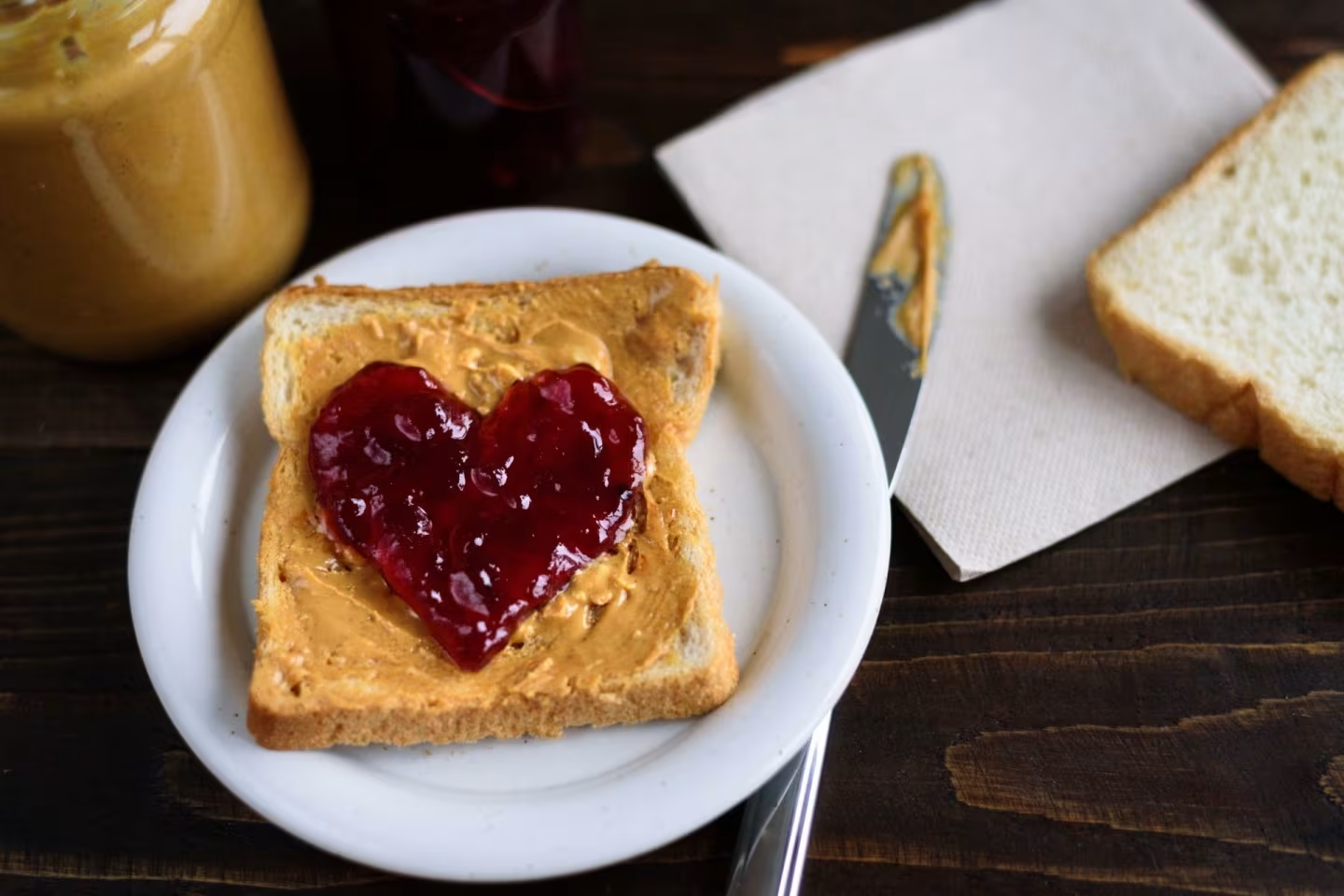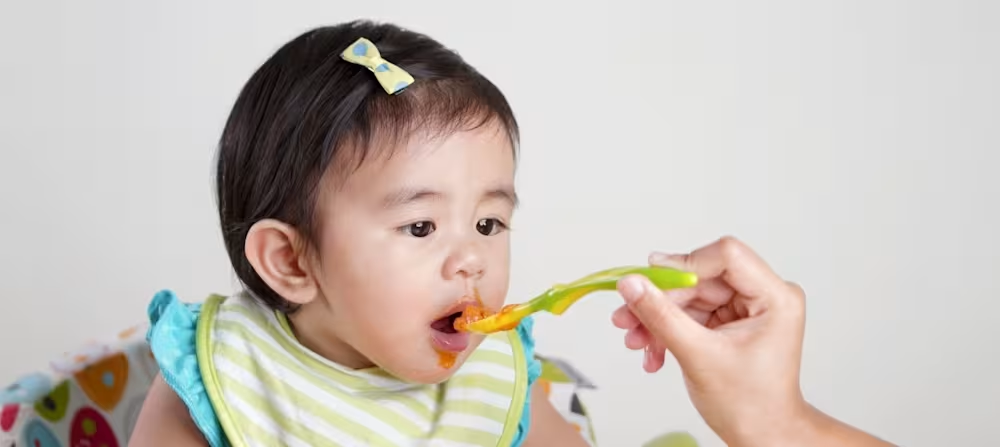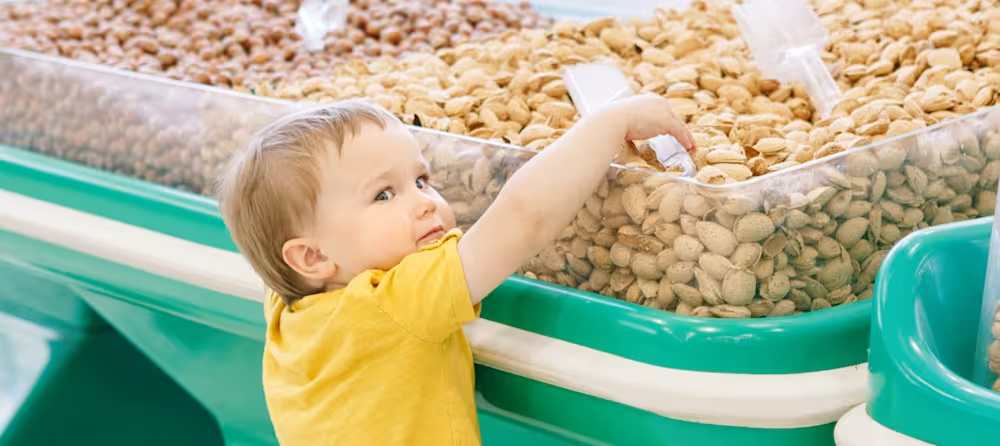Tips for safely introducing peanuts and peanut butter to your baby
Updated Jan 02, 2026

When it comes to feeding babies, peanuts tend to make a lot of caregivers nervous. We get it! They’re one of the top allergens as well as a choking risk. Both of those concerns are enough to make you ask yourself, should I really be serving peanuts to my child?
The answer is yes, as long as you take certain precautions! Knowledge is power, so keep reading to find out all you need to know about safely introducing peanuts and peanut butter to your baby.
Why you should introduce peanut products early
Many caregivers have heard about infant peanut allergy, and it puts them off introducing peanuts and peanut butter to their babies. But in 2015, a groundbreaking research study [] known as the LEAP trial changed what allergists and pediatricians understood about the risk of developing food allergies. The study showed that early introduction of peanuts among infants with a high risk for a peanut allergy actually lowers the frequency of developing one.
Prior to this research, later introduction of the top allergenic foods, including peanuts, was recommended.
Now, given the results of the LEAP trial, the American Academy of Pediatrics [] recommends babies are introduced to peanuts and other top allergenic foods around 6 months old, when they begin eating solid foods.
If you have a family history of or other risk factors, make sure to discuss introducing peanuts with your pediatrician.
When to introduce peanuts and peanut butter to your baby
You may ask, when can babies have peanut butter? Most babies can be introduced to peanut products around 6 months of age when they start solids. This includes peanut butter, powdered peanut butter, and peanut butter puffs. (Whole peanuts or peanut pieces are considered choking hazards until about age 3 or 4 years.)
Can babies between 6 and 9 months old eat peanuts?
Yes and no! 6 to 9 month old babies can eat peanut butter and other peanut products, but they should not eat whole peanuts or peanut pieces. It’s best to offer peanut butter in small amounts for this age group.
Can babies between 9 and 12 months old eat peanuts?
Babies 9 - 12 months old can continue to eat peanut products — but not whole nuts. Continue to serve in small amounts. Babies at this age are able to pick up foods with their fingers and may enjoy peanut butter puffs.
Can babies over 12 months old eat peanuts?
Yep! Babies over 12 months can continue to eat peanut products and may enjoy peanut butter in more mixed foods such as a peanut butter and jelly sandwich or a peanut butter muffin.
How to introduce peanut products to your baby for the first time
Before introducing peanut butter to your baby for the first time, make sure you get the go-ahead from your pediatrician, especially if your baby is at a higher risk for a peanut allergy. We recommend starting with a small amount of peanut butter. If possible, choose one that is sugar-free and made with simple ingredients (just peanuts and maybe salt).
Serving peanut products for baby-led weaning
One of the easiest ways to serve peanut butter for is to spread it thinly on a piece of toast and then cut it into pinky-sized strips. Pair with fruit for a balanced meal or snack.
Mixing peanut butter into purees
Peanut butter mixes well with a variety of purees including baby cereal, banana, or apple. You could also make a peanut butter puree by thinning it out with breast milk or formula.
3 tips for introducing peanut products to your baby
Introducing peanuts for the first time can be a bit stressful, even for those with a low risk of food allergies. Use the following tips to breathe a little easier.
1. Serve early in the day
Offering peanut products earlier in the day allows you time to watch for signs of a reaction. Most reactions occur within 1 to 2 hours of consuming a food.
2. Serve with a familiar food
It’s not recommended to serve peanut butter on its own due to its stickiness. Pair it with a food your baby has already been introduced to; if they have a reaction, you’ll know it’s likely from the peanut butter and not the other food.
3. Make sure baby is healthy
Avoid introducing peanuts or peanut products if your baby isn’t feeling well. Symptoms from a cold or other illness could mask or be mistaken for signs of a food allergy.
Signs and symptoms of a peanut allergic reaction in babies
Food allergies can be tricky because they vary greatly in terms of how they present themselves. There is no set group of signs and symptoms that always occur with a food allergy, and the symptoms can vary from exposure to exposure as well.
According to the American Academy of Pediatrics [], there are several common symptoms and signs of food allergies. They include:
Skin problems
Hives (red spots that look like mosquito bites)
Itchy skin rashes (eczema, also called atopic dermatitis)
Swelling
Breathing problems
Sneezing
Wheezing
Throat tightness
Stomach symptoms
Nausea
Vomiting
Diarrhea
Circulation symptoms
Pale skin
Light-headedness
Loss of consciousness
What to do if your baby has a reaction
If you suspect your baby is having an allergic reaction to peanuts or peanut products, stop serving them immediately and call your pediatrician. They will guide you on what your next steps should be.
If your baby is having trouble breathing or is having a severe reaction, call 911 right away.
Are peanuts healthy for babies?
Peanut products can be a healthy addition to your baby’s diet when served in a safe and age-appropriate way. Peanut butter, for example, provides plant-based protein, energy-dense fats, and beneficial vitamins and minerals.

Peanut nutrients for babies
In addition to protein and fat, peanuts are rich in fiber, which helps regulate bowel movements and build a healthy gut. Peanut products also contain B vitamins, folate, magnesium, and vitamin E, all of which support optimal growth and development.
Is peanut a choking hazard?
Yes, whole peanuts and peanut pieces are choking hazards for babies and children under the age of 4 years. Other peanut products, such as peanut butter, should be served in small amounts due to their sticky texture.
Takeaway
It’s natural to be worried about feeding peanuts to your baby – most of us have heard that it’s a common allergen. But, according to the American Association of Pediatrics, children who have peanuts as one of their first foods are actually less likely to develop allergies to them.
However, whole peanuts and peanut pieces can be a choking hazard for young babies. Start with a tiny amount of peanut butter (⅛ tsp) and if there is no reaction, try gradually increasing the amount over the next few days. Offer only peanut butter in small quantities until your baby is 12 months old. Keep your eye on allergic reactions, and get the go-ahead from your pediatrician before introducing peanuts for the first time.
Share article:
Note: The content on this site is for informational purposes only and should not replace medical advice from your doctor, pediatrician, or medical professional. If you have questions or concerns, you should contact a medical professional.
4 Sources
Share article:







